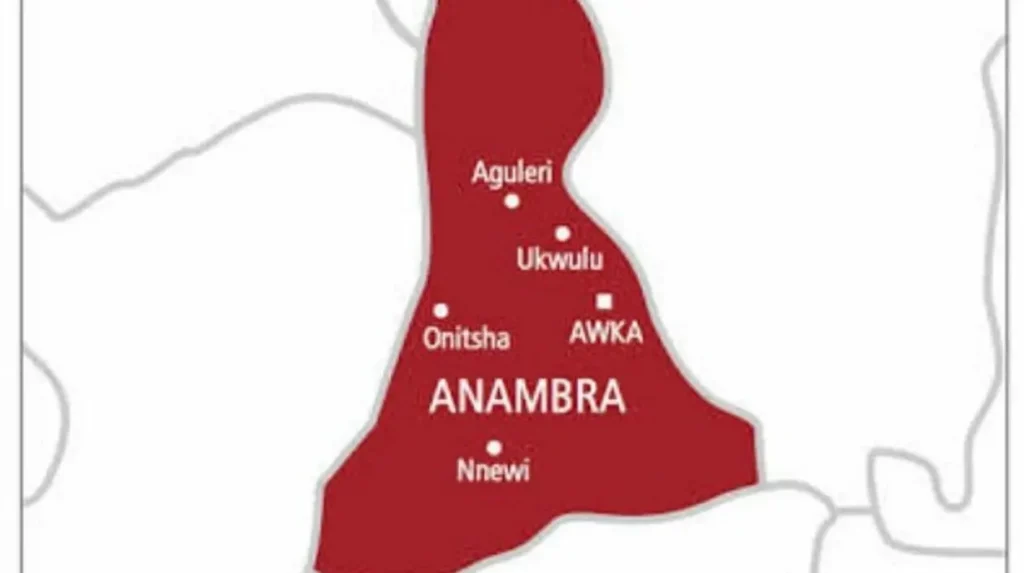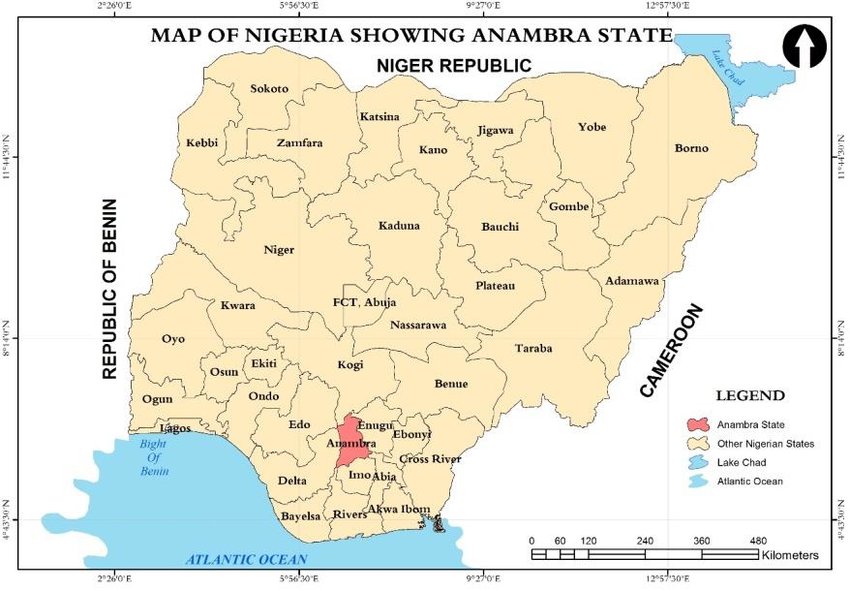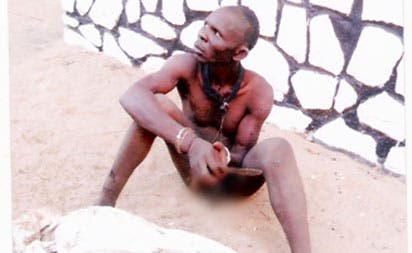This post is about harmful widowhood practices and belief in witchcraft. It’s not about a ritual murder.
It all happened in Umunankwo, a village in the Ogbaru Local Government Area of Anambra State, in south-east Nigeria. The story goes back to April last year, when three brothers chased and banished their widowed sister, a 53-year old mother of two children, from the community accusing her of being a witch. The incident was filmed and went viral. Subsequently, the three men were arrested. For briefness sake I may refer to the second and third articles below.
The incident drew once more attention to existing harmful widowhood practices and the plight of women in Anambra State in general.
Moreover, also in Anambra State the belief in the power of supernatural forces exist, though it is unknown at which scale. Related superstitious practices may go hand-in-hand with ritualistic killings (‘money rituals’) and trafficking in human organs which unfortunately also occur in this state in South-East Nigeria. See my February 19, 2023 post ‘Anambra State Police Officers in alleged ritual killing, organ harvesting ring arrested‘.
Anambra State is located in the South East geopolitical zone of the Federal Republic of Nigeria. The Federal Republic of Nigeria is divided into six geopolitical zones commonly called zones.

Anambra State is an inland state and one of Nigeria’s smallest states with a surface area of only 4,844 km2 (only Lagos State is smaller). Anambra ranks number 14 by population with an estimated population of 8 – 10 million people (2024), most of them christians though traditional beliefs continue to exist. The majority of the population belong to the Igbo ethnic group (in the 1960s, Anambra State was part of the failed secessionist Republic of Biafra). The region nowadays known as Anambra State has a a rich cultural history.
I already mentioned a prime reason to post this item, the existence of harmful widowhood practices, another major reason is the wish to draw attention to local initiatives and organizations to end these outdated and cruel practices which in fact represent human rights violations.
In this context I wish to mention the commendable work of the organization Advocacy for Alleged Witches, an interventionist group leading campaigns to end witch persecution in Africa. The organization’s Director is the well-known Leo Igbe, more than once mentioned on the present site. His work cannot be overrated and I wish to congratulate him once more with his work and achievements.
Last but not least I wish to congratulate Genevieve Osakwe, the Magistrate of the Children, Sexual and Gender-Based Violence Court, in Awka, the state capital, and the Commissioner for Women and Social Welfare in the state, Ify Obinabo, for their swift actions.
Thanks to them the perpetrators of the crime are being prosecuted and the victim, Nneka Uzor, can now start a new life in a new apartment.
(webmaster FVDK)
Anambra State, Nigeria: widow initially banished over alleged witchcraft gets new apartment
The widow, Nneka Uzor, a 54-year-old mother of two, was banished by her three brothers from Umunankwo Community in Ogbaru Local Government Area of the south-east state on 30 April 2023.

Published: February 25, 2024
By: Chinagorom Ugwu – Premium Times Nigeria
A widow in Anambra State, who recently returned to her community after she was banished for allegedly being a witch, has gotten a new apartment.
The woman, Nneka Uzor, a 54-year-old mother of two, was banished by her three brothers from Umunankwo Community in Ogbaru Local Government Area of the south-east state on 30 April 2023.
PREMIUM TIMES, last year, reported (see below – webmaster FVDK) how the widow was spotted in a video clip being led out of the Umunankwo by the community members who hurled abuses at her while two masquerades flogged her.
The three brothers —- Lazarus Uzor, Anozie Uzor and Valentine Okwuosa —- were later arrested and arraigned before the Children, Sexual and Gender-Based Violence Court in Awka.
The arrest and arraignment of the suspects were facilitated by the Commissioner for Women and Social Welfare in the state, Ify Obinabo, who promised to ensure that the woman was reunited with the community.
This newspaper also reported that Mrs Uzor, the banished widow, returned to the community in January and reconciled with the villagers, following the commissioner’s intervention and the traditional ruler of the community, Fidelis Nsofor.
New apartment
Mrs Uzor has now gotten a self-contained apartment through the assistance of Advocacy for Alleged Witches, an interventionist group leading campaigns to end witch persecution in Africa.
The Director of the group, Leo Igwe, told PREMIUM TIMES on Saturday that the group decided to help Mrs Uzor after they learnt that the widow had been staying with a relative after her return to the community.
“We found out that while she returned to the community, she had no money, no apartment; her business had collapsed. Nothing. She was almost displaced,” Mr Igwe said, recalling that the widow also made the request when the group reached out to her.
“So, we raised some money and we sent it to her to rent an apartment,” he said.
The group director commended PREMIUM TIMES, saying it was the paper’s report that made them aware of the widow’s travail.
Joy overflow
Mrs Uzor expressed joy while she shared a video clip of the new apartment with the group director.
“You people have met me in my point of need,” she said in the three-minute video clip, almost shedding tears of joy.
“This is wonderful,” the widow exclaimed as she showed the inner part of the apartment.
“So, at last, I can boast of saying this is my own.”
She asked God to bless members of the group who secured the apartment for her.
Source: Widow initially banished over alleged witchcraft gets new apartment
Related:
Widow banished over alleged witchcraft returns to community
The woman, a 54-year-old mother of two, was banished by her three brothers from Umunankwo Community in Ogbaru Local Government Area of Anambra State.
Published: January 23, 2024
By: Chinagorom Ugwu – Premium Times Nigeria
A widow in Anambra State, who was banished for allegedly being a witch, has been reunited with her community.
The woman, Nneka Uzor, a 54-year-old mother of two, was banished by her three brothers from Umunankwo Community in Ogbaru Local Government Area of the south-east state on 30 April 2023.
PREMIUM TIMES, last year, reported how the widow was spotted in a video clip being led out of the Umunankwo by the community members who hurled abuses at her while two masquerades flogged her.
In the clip, the people, who were heard accusing Mrs Uzor of poisoning the community’s food and refusing to go for appeasement, led the woman to a road junction where they pronounced her banished from the community.
At the time they pronounced her banished, the widow had collapsed in the middle of a road, apparently due to fatigue.
The three brothers – Lazarus Uzor, Anozie Uzor and Valentine Okwuosa – were later arrested and arraigned before the Children, Sexual and Gender-Based Violence Court in Awka.
The arrest and arraignment of the suspects were facilitated by the Commissioner for Women and Social Welfare in the state, Ify Obinabo, who promised to ensure that the woman was reunited with the community.
Reunion
Mrs Uzor, the banished widow, has been reconciled to the villagers and brought back to the community, according to a statement on Monday by Chidinma Ikeanyionwu, a media aide to the commissioner.
Ms Ikeanyionwu said the reconciliation took place at the palace of the traditional ruler of Umunankwo, Fidelis Nsofor.
She said the commissioner, heads of men and women groups in the community, community leaders and the suspects, among others, attended the event.
The statement indicated that following the traditional ruler’s directive, community members gathered at the junction, where they had earlier banished the widow, to bring her back.
Masquerades also accompanied her back to the community.
Source: Widow banished over alleged witchcraft returns to community
This is how it started:
Brothers label their widowed sister witch, banish her from community
The victim is a mother of two .
Published: May 22, 2023
By; Chinagorom Ugwu – Premium Times Nigeria
Three people have banished their widowed sister from their community for allegedly being a witch.
The incident happened on 30 April in Umunankwo, a community in Ogbaru Local Government Area of Anambra State, south-east Nigeria.
Chidinma Ikeanyionwu, a media aide to the Commissioner for Women and Social Welfare in the state, Ify Obinabo, disclosed this in a statement on Monday.
The widow, Nneka Uzor is a 53-year-old mother of two. She is also a caterer.
Ms Ikeanyionwu gave the names of the suspects as Lazarus Uzor, Anozie Uzor and Valentine Okwuosa.
She said the suspects’ arrest was facilitated by the commissioner, Mrs Obinabo, after a video clip showing the widow being abused and banished from the community went viral on social media.
Viral video
In the clip, seen by PREMIUM TIMES earlier this month, the widow was spotted being led out of the community by members of the community and two masquerades.
As she walked, the community members hurled abuses on her, while the two masquerades flogged her.
“On this day, Nneka (Uzor) committed an atrocity. She poisoned the food of the community, and she refused to go for appeasement. On that purpose, masquerades have arisen to say a final goodbye to Nneka to the boundary of no return,” a voice was in the background of the video was heard saying.
“Nneka, you shall not come back again (to the community). You have been ostracised. Today, marks her last day (in the community). The masquerade has ostracised her,” the voice added.
Apparently exhausted and weak, the widow collapsed in the middle of a road and the people abandoned her there.
Arraignment
Ms Ikeanyionwu said the suspects were later arrested and arraigned before the Children, Sexual and Gender-Based Violence Court, in Awka.
The statement was silent on the details of the charges against the suspects.
When the charges were read and interpreted to the defendants, they pleaded not guilty of the charges, she said.
Ruling on bail application by the suspects, the Magistrate, Genevieve Osakwe, held that the matter was a bailable offence.
Ms Osakwe, consequently, granted them bail in the sum of N700, 000, but demanded that the suspects should provide the traditional ruler of the Umunankwo Community, the parish priest of the community’s Catholic Church or the president-general of the community as sureties.
In her reaction, the commissioner, Mrs Obinabo, expressed satisfaction with the decision of the court, Ms Ikeanyionwu said.
The commissioner assured that she would get justice for the widow and other widows in the state who are going through such ill-treatment.
She warned residents of the state to desist from any form of harmful traditional practices against widows, pointing out that Anambra State Government has zero tolerance for such “inhumane acts.”
Banished widow speaks
Mrs Uzor told the commissioner that she began living in her parents’ house in the community nine years ago after she lost her husband.
The widow regretted that her brothers and other family members had been abusing her since she began living with them in their parents’ house.
On the issue of being banished from the community, she narrated that someone had died in the community and that on the day of the person’s burial, she was invited like others, which made her pass a night there.
She said she was surprised that her brothers and other family members woke her up the next morning at about 5:30 a.m. with the masquerades and subsequently chased her out of the community.
Nkiru Uzor, a sister to the widow, alleged that it was one of the suspects, Lazarus, the immediate past president-general of the community, that instigated the banishment while Nnamdi, another suspect, coordinated the act and also filmed the incident.
Source: Brothers label their widowed sister witch, banish her from community
READ ALSO: Anambra women protest against harmful widowhood practices



















